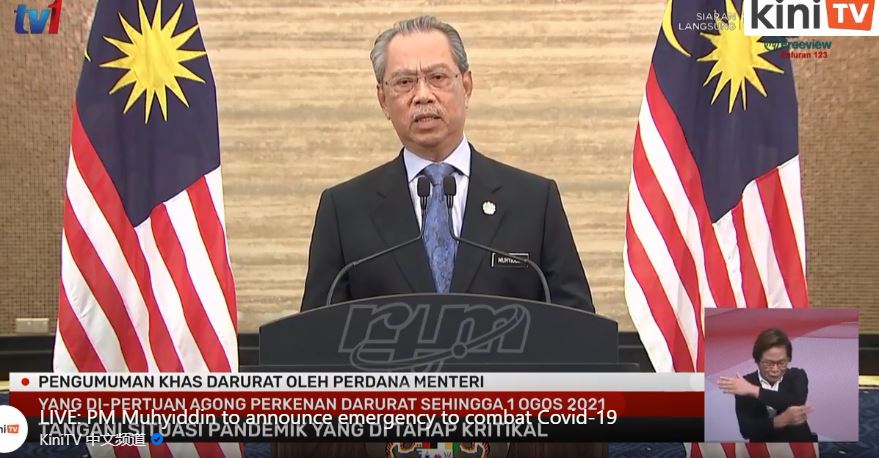In the face of a widely panned state of emergency and increasing signs that foreigners are unwelcome in Malaysia, the government’s eager calls for more foreign investment may go unanswered.
During a live address on Tuesday, January 12, Prime Minister Tan Sri Muhyiddin Yassin announced that he had persuaded the King to declare a state of emergency. During the address, he tried to assuage the fears of foreign investors. Whether they will be reassured is another matter. The fact is, Malaysia still has a relatively low number of cases, and a very low death rate, so declaring a state of emergency was considered by many as an overreaction. Political rivals (along with plenty of Malaysians) regarded it as little more than an attempt by the Prime Minister to stay in power. It is certainly true that he commands a very slim majority in parliament, and his largest coalition partner has threatened to quit.

The Prime Minister also stated that the government had developed a six-stage strategy to ensure economic recovery. Clearly, this should be a major priority given the damage caused by the Covid-19 crisis. Attracting foreign investment is an integral part of this.
When looking for countries in which to invest, foreign investors look for things like political stability, ease of doing business, financial considerations (such as tax rates and local wages), and a welcoming environment for working expats. Proclaiming a months-long state of emergency – which has attracted open and widespread domestic criticism – seems unlikely to encourage foreign investment.
Moreover, the government’s attitude towards resident expats has sent a very different message about how welcome they are. Last year, Malaysia refused to allow many resident expats back into Malaysia when they first introduced the MCO. Tens of thousands of Malaysians were allowed back, which is entirely understandable, but working expats who were caught outside the country were refused entry.
Every country struggled with making the right decisions to control the spread of the virus, but locking out foreign residents who help the local economy and live there – and who certainly posed no greater health risk than citizens coming from abroad – was regarded by most as a bad decision. For that reason, most governments allowed resident expats with long-term visas to re-enter their country along with local nationals. Malaysia, however, chose to lock them out. It clearly alienates people who have invested in the country and are contributing to its economic success when they are denied access to their jobs and homes.
Eventually, after some lobbying from various foreign business chambers, the decision was made to let them back in. However, the requirements to enter were quite onerous and did nothing to make these expats feel welcome or appreciated. It was also never explained how the complicated entry requirements helped stop the virus spreading.
Meanwhile, those with Malaysia My Second Home (MM2H) visas, who had relocated to Malaysia and collectively contributed billions of ringgit to the economy by making the country their home, were treated even worse. Many were locked out of the country for months and, as Malaysia is for many of them their only home, suffered major expenses and discomfort, as they had to find places to stay and often were stuck in hotels overseas.
As the Malaysian government had invited them to come and make their homes here, many had chosen to retire and spend the rest of their lives here. They had been promised a warm welcome, and overall they were very happy with their choice – until last year. It was understandably a rude shock to be treated so callously, especially since there were only a few hundred of them outside the country, while tens of thousands of Malaysians were allowed free entry, even those that no longer had their homes here.
Rightly or wrongly, many expats took this as a clear sign that the current government was sending a message that they no longer wanted them living here. On a superficial level, it is easy to see how a desire to kick out expats and give their jobs to the growing number of unemployed Malaysians might be a popular choice; however, the notion that skilled expats take jobs away from Malaysians is rarely the case.
The reality is that local unemployed citizens would be unlikely to have the required skills, and certainly the large number of unemployed recent graduates are rarely appropriate candidates for the kind of jobs given to expats. Expats are hired either because they possess skills that are hard to find in Malaysia or foreign investors want to place their regular long-term staff in key positions in order to oversee their investments in the country. Given how onerous and even costly it can be to place an expat here, very few companies would do so if they could find a suitable local applicant. Hiring a Malaysian is much, much easier.
MM2Hers, on the other hand, of course pose no threat to the job market or the economy because they have to pay for everything they consume and they are not looking for employment. They just bring lots of very welcome foreign exchange into the country, often acting as unofficial goodwill ambassadors for Malaysia in the process, which makes the way the government has treated them all the more surprising. Sadly, now we hear many say they are leaving or plan to leave because of the way they have been treated.

At TEG Media, we have been promoting Malaysia to foreign investors and the international community as a whole for 25 years. We have also actively promoted the MM2H programme for 15 years, and were heavily involved in its formative stages, as well. We have enjoyed excellent relations with previous governments, who welcomed our efforts, even giving my family and me unsolicited permanent residency as a sign of appreciation.
The current government, conversely, does not wish to engage with us at all, and many requests to meet up or obtain answers to questions have been ignored. We have heard similar complaints from a number of business chambers who have told us engaging with senior government officials has become very hard and they often do not seem very receptive to feedback.
All these are indications that foreigners and their investments will not find Malaysia that attractive when they start doing their due diligence. One thing is clear: Merely saying foreign investments are welcome when the actions do not support that will be a very hard sell, especially in the aftermath of the global downturn caused by the pandemic. Investors will likely be more particular about where they place their investments. A country that has proclaimed a long-term state of emergency for little apparent reason and seems to be actively discouraging and alienating foreign residents will surely be of little appeal.
We would love to go back to promoting Malaysia, as we have long appreciated and enjoyed the many good things about the country. But it only seems sensible to do so again when the actions taken by the government make it clear that expats who help the country in many ways are welcome and valued.
"ExpatGo welcomes and encourages comments, input, and divergent opinions. However, we kindly request that you use suitable language in your comments, and refrain from any sort of personal attack, hate speech, or disparaging rhetoric. Comments not in line with this are subject to removal from the site. "



















